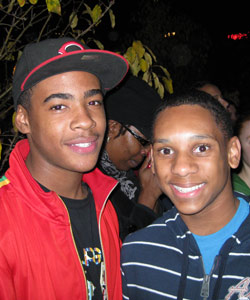|
|
I didn’t make it into the media pen, and I didn’t get to the party I was supposed to cover in time, so, at about 9:30 p.m., my election night coverage was looking pretty skimpy. Somehow, in all the crowds that were wandering around downtown, I managed to hook up with a few friends on Michigan Avenue, and we decided— wholeheartedly and foolishly—to cut to the center of the "overflow," that is, the tens of thousands of people who were loitering on the eastern end of Grant Park looking at Jumbotrons and stepping on each other’s feet.
In the crowd, there were lots of people who, like me, had no magical ticket, but who took the train down or hopped the #3 King Drive bus to be part of the evening all the same. I was standing near Olivia Graham, who lives in Matteson, so I asked her why she’d decided to fight the crowds to get into the park. A middle-aged African-American woman who was standing proudly with her family, Graham said she couldn’t stay away even though she could have watched the results on TV. "I could have said I don’t have tickets to get in so I’m going to stay home. But I wanted to be part of history whether he won or not." "History" meaning the closest a black man has gotten to the White House, she said.
From then on, I decided to interview African-Americans about this "historic moment" to see if it felt, well, different than how it felt for me: The younger people I spoke with, such as Billy Coleman, a 23-year-old student at Roosevelt University, said that they believed the day would come when America would have a black president. But their excitement was more about the Obama’s promise of change than the fact that he will be the first black man in the White House. "He’s on point," Coleman said. "I feel like he is going to bring true change. I feel like something is going to happen." When asked if he’d thought this day would come in his lifetime he said yes. "I knew it was coming."
Similar sentiment from Marquette Smith, 16, and Jeremy Leavy, 15, who, with friends, took the train in from Rockford. To film the trip and the crowds and the speeches and each other goofing off, they’d brought a digital camera and, while we talked, they excitedly passed it around. "We’ve been walking around Chicago since noon," Leavy said. Why’d they make the trip? "I believed he was going to win, but we needed to see the results to believe it." I asked Smith for his perspective: "Barack deserves it," he said. "It’s not the fact that he’s black, it’s the fact that he’s good for the position." He paused, he looked at his friend, and he copped a grin. "But it is good that he’s black . . . Can I look at what you wrote down and make sure you got it right?"
There was definitely a generational divide. The older people I spoke with said they’d never imagined a black man would be elected in their lifetime. For them, it was a real historical moment. Shelley Cooper came up to the park from the far South Side neighborhood Jeffery Manor, which is down near Calumet, near one of the city’s most blighted areas. Now she was looking at a huge crowd from a little sanctuary she’d found against a tree. "I have a problem with crowds," she confessed. "That’s why I’m under this tree. But looking around, I see that people care again. It’s wonderful. This is our future out here. This has made people care what happens politically." I asked Cooper if, as a black woman, she had imagined an African-American president: "When I was a kid, yes. But as I became an adult, no. I stopped thinking it would happen. Now there’s hope for us, there’s hope for everybody. Everybody should feel included."
As a reporter, I’m programmed to record everything I’m a part of. But when Obama came on the Jumbotron, the overflow fell amazingly silent and no one wanted to talk to me anymore. Who could blame them? So I took off my green wedges, which were squeezing the life out of my feet, and stood in the grass. When Obama stopped speaking and history had unfolded, the overflow crowd lurched back onto the street, and I followed.
Photograph: Denise Penacerrada



